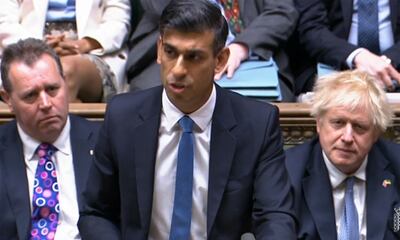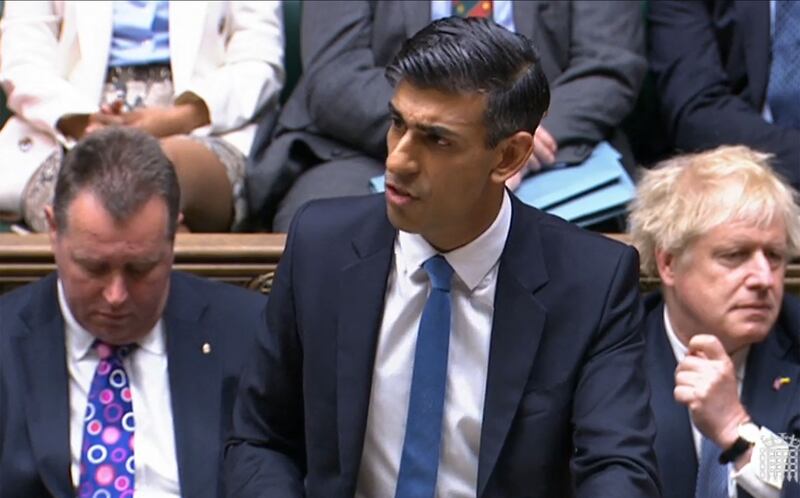The British chancellor said on Friday the imposition of a 25 per cent windfall tax on energy companies was the right move for the UK economy to resolve the cost-of-living crisis.
On Thursday, he also handed out special payments to hard-pressed households.
But Rishi Sunak's announcement sparked warnings from businesses of the long-term negative effect on the UK economy.
The charge was part of a £15 billion ($18.87bn) giveaway by the Treasury to help poorer people and families through the huge increase in energy prices.
Mr Sunak told parliament that some households would receive a maximum of £1,200 in free handouts, with every home receiving at least £400.
But the increase from 40 per cent to 65 per cent on tax for energy companies, which will last until December 2025, was described by business chiefs as damaging to the economy.
Deirdre Michie, chief executive of Offshore Energy UK, the representative body for the oil and gas industry, said: "This is a disappointing and worrying development for industry, the shock waves of which will be felt in offshore energy jobs and communities, and by consumers, for years to come.
"In April, we welcomed the government’s British Energy Security Strategy, which pledged ‘secure, clean and affordable British energy for the long term’. We thought long-term meant years or decades, but it seems to have meant just a few weeks.
"The strategy’s focus was on attracting investment to build a greener energy system to reduce dependence on imports. These new taxes will achieve the exact opposite of what the government promised in April.
"They will drive away investors and so reduce UK energy production. That means less oil, less gas, and less renewables. It also makes it much harder for the UK to reach net zero by 2050.
"It’s essential to help consumers through this cost-of-living crisis, but damaging the energy industry through sudden new taxes is the wrong approach. The short-term gain is small, but the long-term pain will be huge."
On Friday, Mr Sunak insisted the levy fairly taxed extraordinary profits on energy companies and said the investment relief had been described as “very generous”.
“When they invest more they will be taxed less,” he said in a BBC interview.
“We’ve got the balance right. We tax profits fairly but incentivise investment in economy, jobs and long-term energy security.
He said he was responding to circumstances with pragmatism.
Mr Sunak said that the new support package would have little effect on inflation.
"My view is that it will have a minimal impact on inflation," Mr Sunak told Sky News.
Asked if it would be a one percentage point impact, he said: "Much, much less than that."
However, with the industry benefiting significantly from the high energy prices after Russia’s invasion of Ukraine and the pandemic, Mr Sunak’s decision was met with broad support from the public.
“The oil and gas sector is making extraordinary profits … as the result of surging global commodity prices,” the chancellor told parliament. “I am sympathetic to the argument to tax those profits fairly.”
For months, the Labour opposition has been calling for a windfall tax but Mr Sunak managed to avoid the term by calling it a “temporary targeted energy profits levy”.
Throughout Mr Sunak's statement, Prime Minister Boris Johnson sat on the front bench nodding and smiling in support, seemingly demonstrating that he had moved on from the Sue Gray “partygate” report, released on Wednesday, which condemned Downing Street’s breaches of lockdown rules.
There is a suggestion that the tax announcement was introduced to deflect attention from the partygate fall-out, in which three more Tory MPs on Thursday handed in letters of no confidence in Mr Johnson’s leadership.
Mr Sunak said the support package was worth £15bn, taking the total spent on Britain’s bail-out cost-of-living crisis to £37bn.
“This government will never sit idly by while there is a risk that some people in our country might be set so far back they might never recover,” he said. “This is simply unacceptable. We will never allow it to happen.”

Other energy companies, such as those producing renewables, will also take a large hit to their profits, as Mr Sunak indicated that further taxes would be imposed on them after a review.
The chancellor’s logic is that energy companies currently making good returns should help those most in need. The levy on them is expected to raise £5bn.
Business chiefs condemned the levy, claiming the flood of cash into the economy will lead to greater inflation.
Rain Newton-Smith, chief economist at the Confederation of British Industries, said: “Despite the investment incentive, the open-ended nature of the energy profits levy — and the potential to bring electricity generation into scope — will be damaging to investment needed for energy security and net-zero ambitions.
“It sends the wrong signal to the whole sector at the wrong time against a backdrop of rising business taxation elsewhere.”
His concerns were echoed by Hannah Essex, co-executive director of the British Chambers of Commerce.
“Unless steps are also taken to ease business costs, they will likely feed into the inflationary pressure on the economy and quickly eat into the financial support announced today,” she said.

Conservative MPs also raised concerns over the levy, suggesting it could throttle economic growth.
“Is there not a risk that the exchequer will lose more in growth than it will gain in the windfall tax?” said David Davis, a former Cabinet minister.
Millionaire businessman and MP Richard Drax told Mr Sunak that he was “throwing red meat to socialists” with his taxation.
But there was some relief for businesses after the chancellor promised that for every £1 invested, they would receive 90 per cent back in tax relief.
“Crucially, the relief only covers UK extraction, that is fossil fuels,” said Dr Simon Evans of Carbon Brief, the climate change think tank.
“So, UK oil and gas companies are going to be hit with a windfall tax, which they can largely avoid by increasing investment, as long as they invest in UK extraction of fossil fuels.”
Tom Clougherty, head of tax at the Centre for Policy Studies, said: "We remain highly sceptical of the fiscal and economic case for a windfall tax.
"We are concerned about the impact it could have on long-term investment in the UK energy sector, at a time when it is desperately needed — and we cannot afford to get into the habit of treating energy firms as cash cows.
"That said, the chosen version of the levy was not as bad as it could have been, due to the inclusion of generous investment allowances as a compensatory measure.
"In the longer term, incentives will do much more to attract investment than threats — so the key thing is to ensure that we develop an attractive and stable tax regime that supports the government's energy security strategy and the transition to net zero, as well as investment in the UK more broadly."







